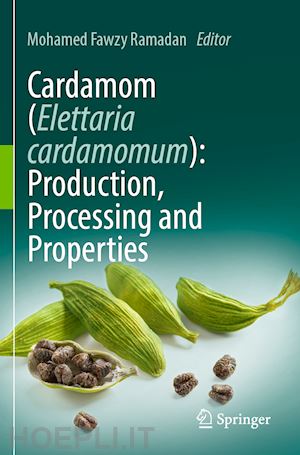
Questo prodotto usufruisce delle SPEDIZIONI GRATIS
selezionando l'opzione Corriere Veloce in fase di ordine.
Pagabile anche con Carta della cultura giovani e del merito, 18App Bonus Cultura e Carta del Docente
Cardamom (Elettaria cardamomum): Production, Processing & Properties aims to create a multidisciplinary forum of discussion on E. cardamomum, emphasizing its botany, ethnobotanical, cultivation, horticultural practices, post-harvest, marketability, phytochemistry, extraction protocols, biochemistry, nutritional value, functionality, ethnomedicinal applications and and processing specifics. The book discusses the botanical distribution, phytochemical constituents, food applications and biological activities of cardamom capsule extracts and essential oil. Also, the text discusses the potential applications of E. cardamomum in food, cosmetics and pharmaceutical products. This book is the first of its kind, a full research work dedicated specifically to cardamom applications and benefits that will be of value for researchers from multiple fields.











Il sito utilizza cookie ed altri strumenti di tracciamento che raccolgono informazioni dal dispositivo dell’utente. Oltre ai cookie tecnici ed analitici aggregati, strettamente necessari per il funzionamento di questo sito web, previo consenso dell’utente possono essere installati cookie di profilazione e marketing e cookie dei social media. Cliccando su “Accetto tutti i cookie” saranno attivate tutte le categorie di cookie. Per accettare solo deterninate categorie di cookie, cliccare invece su “Impostazioni cookie”. Chiudendo il banner o continuando a navigare saranno installati solo cookie tecnici. Per maggiori dettagli, consultare la Cookie Policy.